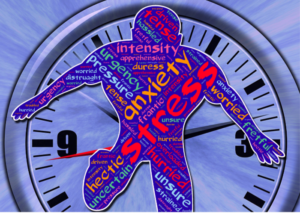
Daily Stress – How to handle it
Ask Mr. Pedometer and Friends…
October 30, 2018
Q: Mr. Pedometer, I try to follow your advice about eating right and moving more, and I am fortunate to be mostly in good health. I say “mostly” because I deal with daily stress, due to family obligations, daily news, and more. Am I the only one who feels this way?
A: Far from it! EverydayHealth.com recently issued a special report entitled “The United States of Stress: You’ll Never Think About Stress the Same Way Again.” Visit their website for the full report, but here is a sampling of what they had to say:
“Stress in the modern world is a constant. When stress doesn’t let up  and is paired with the feeling that we have little to no control over the circumstances that are creating it, that’s called chronic stress. Over and over again, the research points to one key fact: Prolonged or unremitting stress exacts a stunningly toxic toll on the body, brain, mind, and soul. Its ongoing assault wears us down, measurably aging — or ‘weathering’ — our insides, for some of us much more than others. Chronic stress zaps brainpower by damaging neural pathways and skewing judgment. It compromises the immune system. It taxes the heart, kidneys, liver, and brain.”
and is paired with the feeling that we have little to no control over the circumstances that are creating it, that’s called chronic stress. Over and over again, the research points to one key fact: Prolonged or unremitting stress exacts a stunningly toxic toll on the body, brain, mind, and soul. Its ongoing assault wears us down, measurably aging — or ‘weathering’ — our insides, for some of us much more than others. Chronic stress zaps brainpower by damaging neural pathways and skewing judgment. It compromises the immune system. It taxes the heart, kidneys, liver, and brain.”
Their special report was based on findings of a survey of 6,700 Americans, ages 18-64. Three of the key causes of stress among those surveyed were:
Financial instability
Putting others first (including the “sandwich generation,” dealing with aging parents or grandparents at the same time as raising children)
Social isolation – possibly being “connected” via electronic devices rather than in person. We need daily contact with those who make us feel safe, feel seen, and feel heard. (Walking and talking with friendly people is a good way to meet this need!)
To deal effectively with stress, according to Frank Farley, Ph.D., Temple University in Philadelphia, we need three things:
Self-knowledge (What energizes you? What enervates you?)
Motivation (The desire to change one’s condition.)
Resources (Necessary to take effective action.)
Those in the study were asked what they did to manage stress, but the panel who reviewed responses felt that many were distractions rather than strategies. The most common replies were (in the order of frequency) music; TV/videos; sleep; exercise/sports; and talking/venting. The fourth on the list – exercise/sports – was deemed most effective by the reviewing panel.
Stress will continue to be part of your life. Be sure to take care of yourself – not just other people – particularly by making time in your schedule to get out and walk. That can help!